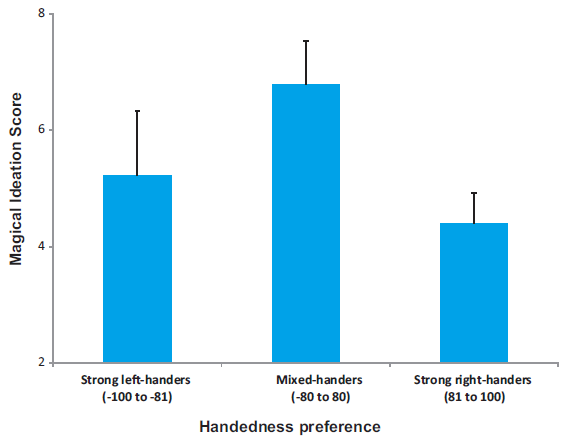People who are ambidextrous are more likely to have magical beliefs. That’s something that was known before but has recently been confirmed by Gjurgjica Badzakova-Trajkov and team from Auckland University, New Zealand.
The figure on the right shows how high their subjects scored on a ‘magical ideation’ scale, which asks questions such as “Some people can make me aware of them just by thinking about me” and “I think I could learn to read other’s minds if I wanted to”.
Handedness was assessed just by asking their hand preferences for a variety of tasks, like throwing or using scissors. As you can see, those people without a strong hand preference were also the most likely to have magical ideas.
So you might think that ambidextrous people are more likely to be religious? Well hold on.
A few years ago Christopher Niebauer, at Slippery Rock University in the USA, showed that ambidextrous people are more likely to believe evolution (in the USA at least). [That paper was sent to me last year, but I can’t remember who sent it. If it was you – well thanks!]
The explanation seems to be that mixed-handed people are more open minded and more creative. So they are more likely to shake often creationist dogma, but also more likely to take other ‘heretical’ thoughts seriously. Incidentally, in a later paper Niebauer also showed that ambidextrous people are more gullible!
Why should this be? Well, one theory is that the brains of ambidextrous people are wired up differently. Not only are their hands less one sided, but their brains also may be more even across the two hemispheres – less ‘lateralized’.
And that’s where Badzakova-Trajkov’s research comes in. She showed that the brains of people who think magically were just as lateralized as the brains of more rational thinkers. What’s more, when she measured handedness by a proper test – rather than just asking people about their preferences – the relationship with magical thinking disappeared.
She concludes from this that the connection between ambidexterity and magical thinking is behavioural, not neuropsychological. What’s probably happening is simply that those people who are open to magical thinking, and who are willing to take on-board radical ideas such as evolution, are also more open to the idea of using their non-dominant hand to do normal daily tasks.
These people are just iconoclasts by nature!
![]() Badzakova-Trajkov, G., Häberling, I., & Corballis, M. (2011). Magical ideation, creativity, handedness, and cerebral asymmetries: A combined behavioural and fMRI study Neuropsychologia, 49 (10), 2896-2903 DOI: 10.1016/j.neuropsychologia.2011.06.016
Badzakova-Trajkov, G., Häberling, I., & Corballis, M. (2011). Magical ideation, creativity, handedness, and cerebral asymmetries: A combined behavioural and fMRI study Neuropsychologia, 49 (10), 2896-2903 DOI: 10.1016/j.neuropsychologia.2011.06.016
Lee Niebauer, C., Christman, S., Reid, S., & Garvey, K. (2004). Interhemispheric interaction and beliefs on our origin: Degree of handedness predicts beliefs in creationism versus evolution Laterality: Asymmetries of Body, Brain and Cognition, 9 (4), 433-447 DOI: 10.1080/13576500342000266
Christman, S., Henning, B., Geers, A., Propper, R., & Niebauer, C. (2008). Mixed-handed persons are more easily persuaded and are more gullible: Interhemispheric interaction and belief updating Laterality: Asymmetries of Body, Brain and Cognition, 13 (5), 403-426 DOI: 10.1080/13576500802079646
 This article by Tom Rees was first published on Epiphenom. It is licensed under Creative Commons.
This article by Tom Rees was first published on Epiphenom. It is licensed under Creative Commons.














